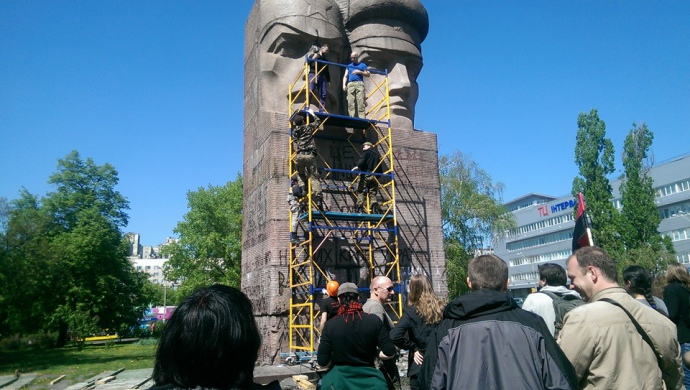One of the most frequently heard arguments offered both by Western countries and some Ukrainians is that the best way for Ukraine to get the occupied territories back is to reform itself and become a wealthy and flourishing country that those now under Russian rule will want to join.
Certainly, Anton Shvets, a frequent commentator on Russian-Ukrainian relations says, “the construction of a wealthy and flourishing Ukraine is something necessary and important” because it is a better place for its people to live and it is better able to defend itself against aggression.
But history suggests that this will not be sufficient to get the occupied territories back. “Somehow, the wealth of South Korea has not attracted the residents of North Korea” to join them just as until the collapse of Soviet power, impoverished East Germany as a country did not want to join much wealthier West Germany.
In short, “the refrigerator far from always defeats the television,” he continues.
The propaganda system developed by the communists and chekists in Soviet times produced “the Soviet man” who as George Orwell pointed out was characterized by “doublethink,” that is, by a readiness to believe what allowed him to remain in “a comfort zone” in the face of repression all around.
“Work with the psychology of the population was one of the most important tasks for the hierarchs of Soviet power,” Shvets says. It was most difficult in East Germany because Berlin represented a window on the West, but elsewhere, those in power used “simpler” and “more massive” methods for “the transformation of consciousness.
The Russian authorities today, Shvets continues, are using all of those techniques and more in occupied portions of Ukraine, manipulating the consciousness of the populations they control and convincing them to accept Moscow’s version of reality under the principle that “everyone lies” but the Russian rulers lie the least and in the interests of the population.
The methods the chekists and their allies used in the past and are using now, he says, “affect even educated people who earlier had critical views.” Such people may try to maintain them, but they also adapt because otherwise they find themselves out of their comfort zone or even subject to open repression.
The population sees only Russian media outlets and those are not “news” services but rather “propaganda” weapons, Shvets says. As a result, the population comes to live in a parallel world where it accepts as “normal” things that are anything but, including turning others in or that what Moscow says is always true.
Even Russian opposition figures are affected by this, he continues. Yes, they may not believe this or that charge against Savchenko or Sentsov and they may criticize Moscow for this or that policy. But they can be counted on to say “’Odesa won’t be forgotten or forgiven’” and “’Crimea may have been taken illegally but the people there wanted to be part of Russia.’”
This is not the result of the legal system or even of the actions of the repressive organs. It is a change in consciousness produced by the state’s control of the media. There are lies in every political system, but what the Soviet, now Russian system has done is change the attitudes of people to these lies: they accept them as true or at least normal and inevitable.
“South Korea could easily conquer the North,” Shvets says, but “what would it do with 20 million people” who not only are starving but have had their minds degraded by such a system. And even Germany continues to have problems with integrating the population from the former GDR.
Ukraine must recognize that the chekists are transforming the consciousness of the people in the occupied territories just as they did in Ukraine when it was part of the USSR. “We cannot excise the consequences of the past transformations” by this group, and Ukrainians now have to deal with yet another wave of them.
“To construct a flourishing Ukraine is beyond doubt a necessary task,” Shvets says, but he adds that he fears that “those of the builders who expect a sausage reaction from those beyond the line [separating Ukrainian and Russian forces] are going to be seriously disappointed.” The longer people are under the chekists in these territories, the more that will be the case.
Related:
- Seven strategies of domestic Russian propaganda (Infographic)
- Kremlin disinformation and Ukraine: The language of propaganda
- A guide to Russian propaganda. Part 1: Propaganda prepares Russia for war
- 15-point checklist of Putin regime’s propaganda techniques
- Propaganda stereotypes paralyze Russia’s potential for change
- Moscow propaganda works by confusing fact and fiction, Pomerantsev says
- Russian propaganda different and much more disturbing than its Soviet predecessor
- The Russian mentality: fear of enslavement and the Resource Curse
- Blurring of moral norms in Russia opens doors for amoral behavior of authorities




